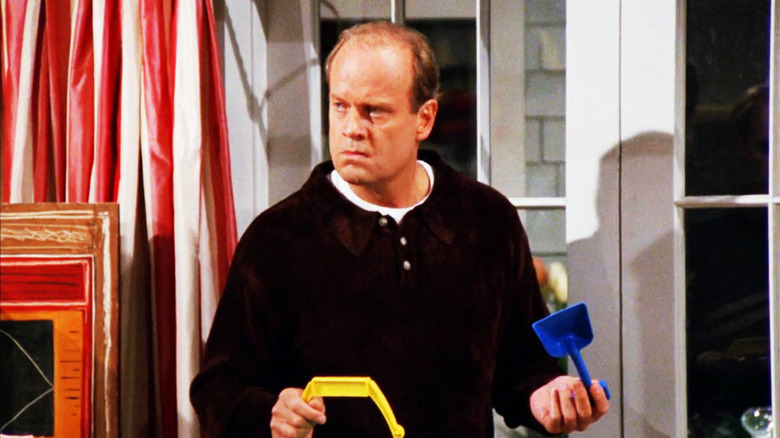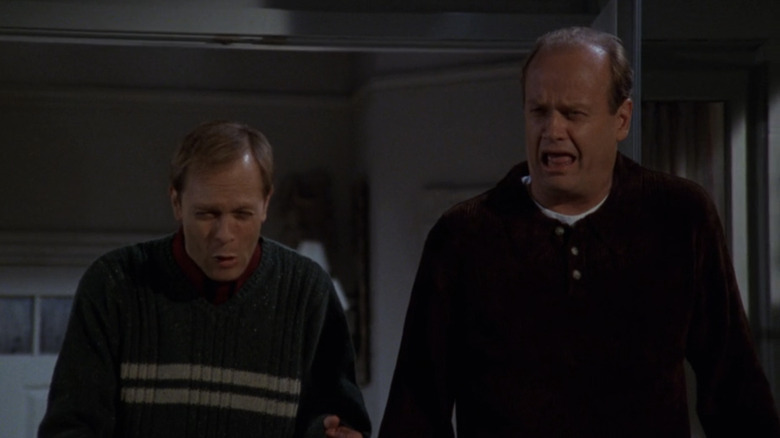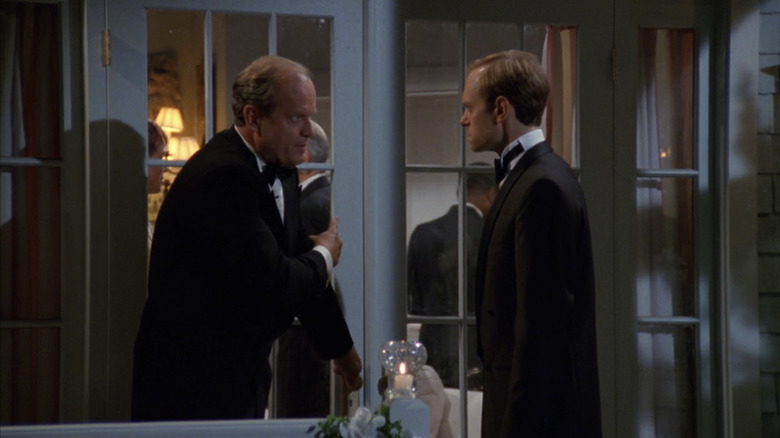Frasier's Dead Seal Episode Was Inspired By Real Events
If there's one thing that sums up the best comedy moments in "Frasier" it's that classic switch from the sublime to the ridiculous. Kelsey Grammer's stuffy psychiatrist was supposed to be endearingly pompous, and mostly remained lovable even at his most snooty. But sometimes, he and his brother Niles (David Hyde Pierce) were just straight up off-putting with their insufferably hifalutin tendencies.
Thankfully, these character traits were the precise thing that made for some of the best moments in the beloved sitcom, which ran for 11 seasons from 1993-2004 and which has recently returned in the form of a neither remarkable nor disappointing revival show. As "Frasier" writer, producer, and showrunner Christopher Lloyd said in Vanity Fair's oral history of the show:
"The vanity and self-importance always helped us lead Frasier into comic situations ... It's not funny to see a guy step into a manhole and get hurt. But if he somehow has done something preposterous to bring that pain upon himself, then you feel freer to laugh."
Such was the case in season 6, episode 8, "The Seal Who Came To Dinner." In this 1998 installment, as soon as Niles mopes into Café Nervosa whining about his "gourmet club" and the "elections to see who will win this year's Golden Apron," you know one of those perfectly bathetic moments is coming — especially after the brothers dismiss Roz's real-world problems with an off-hand comment about her probably breaking a nail. That moment does indeed arrive, but not before some hijinks inspired by Lloyd's real-life experience unfold.
'What is that revolting smell?'
In this classic episode, Niles is depressed after divorcing his ex-wife Maris. In an effort to try to lift his spirits and claim that coveted Golden Apron, Niles and Frasier throw the gourmet club members a classy soirée at Maris' beach house. Upon their arrival, they discover a dead seal that's washed up just outside the decking and hastily try to take the body out to sea and dump it. Of course, that doesn't fix the issue as the seal carcass just washes up again, forcing Frasier to once again try dumping the body, this time with Maris' hideous anchor lamp attached. Naturally, the body washes up once again, this time in full view of Niles' dinner guests. The episode ends with Frasier and his brother being arrested on suspicion of murder after a neighbor spies Niles trying to dispose of the seal carcass and mistaking it for Maris' body. Needless to say, the fancy dinner party plans are well and truly thwarted.
Sounds somewhat far-fetched doesn't it? But as it turns out, the whole episode was inspired by Christopher Lloyd's own experiences renting a beach house. As the producer, also known for co-creating "Modern Family," told Vanity Fair:
"I was renting a beach house, and this half-rotting seal washes up on the shore. A friend and I, with a wine-fortified lunch, got a kayak and paddled out to sea with a 200-pound seal. When I get back to the shore, I see the seal had been brought back by the tide. It became the launching point for Frasier and Niles hosting important people for a dinner party at Maris' beach house when a dead seal washes up."
It's episodes like this that make season 6 one of the best seasons of "Frasier"
Stepping into a manhole
There's something about a dinner party that just seems to prove tricky for Niles and Frasier. Later in season 6, in episode 17 ("Dinner Party") the brothers find themselves defeated after simply trying to plan a fancy get-together — undermining their lofty ambitions with their own insistence on demonstrating their refined taste while simultaneously being incapable of working together. The brothers also tried opening a restaurant of their own back in a classic season two "Frasier" episode which remains infamous enough to be referenced in the "Frasier" revival. That ill-fated restaurant project also ended in a similarly calamitous fashion for the pair.
Really, any dining-related endeavors seem to prove disastrous for Frasier and Niles, with dinner parties in particular providing the perfect backdrop to the classic anticlimactic shenanigans that made "Frasier" such a standout sitcom. Something about the inherent civility of such a social event just made for the ideal opportunity to have Frasier and/or Niles "step into a manhole," to use Christopher Lloyd's analogy.
"The Seal Who Came to Dinner" remains a classic example of how "Frasier" blended its highbrow writing with slapstick and farce to create something truly unique. As "Frasier" writer Joe Keenan told Yahoo, "The thing about farce — or any kind of comedy — is, if the audience ever says, 'Hey, wait a minute. Why would that person do that?' you've lost them." In this case, what makes "The Seal Who Came to Dinner" even better than it would be otherwise is that it's actually based on real events which are just ludicrous enough to be funny but, as Christopher Lloyd's experience proves, not so ridiculous as to seem impossible.


